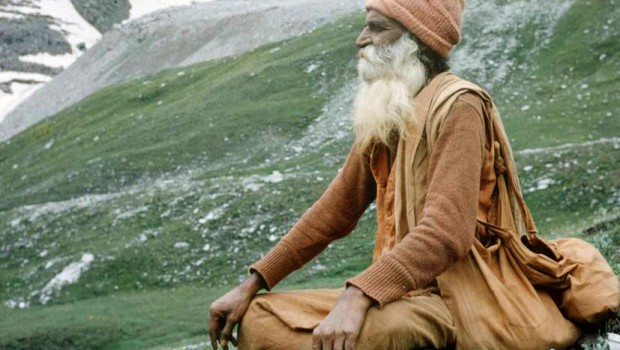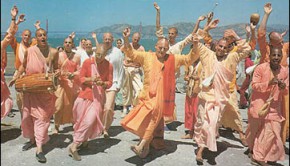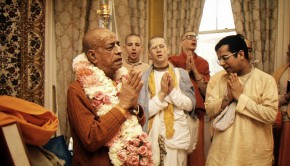How One Should Perform Yoga–MP3 Audio
In India there are some selected places, very sacred place, and the yogis, generally, they go there and sit there alone in a sacred place and as prescribed in the Bhagavad-gita and perform there. Yoga-asana cannot be executed in a public place…
In India there are some selected places, very sacred place, and the yogis, generally, they go there and sit there alone in a sacred place and as prescribed in the Bhagavad-gita and perform there. Yoga-asana cannot be executed in a public place, so that, in assembly. Now, so far this kirtana is concerned… Just like we have performed just now kirtana, this is called sankirtana. Sankirtana means: bahubhir militva kirtayati iti sankirtanam. When we sit down, many people together… When Lord Caitanya was performing this kirtana ceremony five hundred years before, He had in each group sixteen persons taking part in kirtana, and thousands and thousands of people were singing with them. Now, this participation in the kirtana is very easily possible. But so far the yoga system is concerned, that is required any very secluded and sacred place, silent. That is required. It is clearly said here that sucau dese pratisthapya sthiram asanam atmanah. One has to place himself in a sacred place, in a silent place; then yoga system is possible.
Now, comparatively, at the present moment, if you have to practice yoga, then strictly, according to the rules and regulations, you have to leave your home, you have to go out in a secluded place, in a sacred place, and there you have to execute the performance of meditation and yoga. At home it is not possible. So far Bhagavad-gita is concerned, it is a book of authority. It is recommended here that you should find out a place, suitable place for executing yoga. But here, this is also yoga. This is called bhakti-yoga. Sravanam kirtanam. Bhakti-yoga, they have got nine different processes. Out of that, the first two, sravanam kirtanam, hearing and chanting. I am chanting, you are hearing; you are chanting, I am hearing. This is the process, holy name of Sri Krishna. So everyone can take part in it. But in the yoga system, a particular man, if he is expert, if he is able, if he can live alone from home in a secluded place, then perfection of yoga can be attained. It cannot be attained in a city, in a very good assembly, by exercising, gymnastic. No. That is not recommended in the Bhagavad-gita, at least. We may do that according to one’s own way, but that is not the system recommended by the Bhagavad-gita.
tatraikagram manah krtva yata-cittendriya-kriyah
upavisyasane yunjyad
yogam atma-visuddhaye
The whole process is, yoga system, whole process is to purify myself. Purify. Atma-visuddhaye. And what is that purification? The purification is that I am pure spirit.
I am not this matter. And under material contact I am identifying myself that “I am matter.” I am thinking of myself, “I am this body.” This is impurity of my existence. And it is clearly said here that one has to realize his constitutional position, that he is not this matter. (coughs) No water? Atma-visuddhaye. Upavisyasane yunjyad yogam atma-visuddhaye. The whole process is to purify. Now, this purification process, if somebody is not able to go outside home and find out a secluded place, do you think that his purification of his existence will not be possible? No, it will be possible. That is the contribution of Lord Caitanya. He says that
harer nama harer nama harer namaiva kevalam
kalau nasty eva nasty eva
nasty eva gatir anyatha
Lord Caitanya says, “In this age…” This age is called quarrel, age of quarrel. So He says that in this age especially… Of course, this chanting of holy name of Krsna, or God, that is always; throughout the history of Vedic literature you’ll find. But especially in this age it is recommended. Why? Kalau nasty eva nasty eva nasty eva gatir anyatha. Three times He has said that “There is no other alternative, there is no other alternative, there is no other alternative.
” Nasty eva means “There is no other alternative.” This is the only process, this is. Harer nama harer nama harer namaiva kevalam. He says that “In this age, simply chanting of God’s name, that is the only process, that is the only process, that is the only process. And there is no other alternative, there is no other alternative, there is no other alternative.” Why does He say three times? Three times means that this yoga process was possible in the Satya-yuga. Krte yad dhyayato visnum. In those age people could very easily and nicely meditate upon the Visnu.
Sometimes it is recommended that yoga system is meditation in the void. But we do not find in the Vedic literature that yoga system meditation on void. No. It is meditation on Visnu. That will be explained in the Bhagavad-gita. Now, after sitting in a secluded place, in a sanctified place, and according to the sitting arrangement, with tigerskin or deerskin and straw, as it is recommended, then one should sit down there. He should not change his asana, sitting place. Then after sitting, what he has to do? He says, samam kaya-siro-grivam dharayann acalam sthirah. Now, one has to sit down straight. One has to sit down straight so that his skull, this head, and the body, and everything should be straight like that. Samam kaya-grivam. Griva means this neck. The neck and the skull and the body should be in one straight line. Samam kaya-siro-grivam dharayann acalam. And should not move. Sit down like this. Sampreksya nasikagram. And one has to see the top portion of the nose. Not that one has to close his eyes completely. No. Then you cannot see. Sampreksya nasika agram. You have to see the upper portion of the nose. That means if you… I have seen in some of the yogic societies, they close the eyes completely, and some of them, about fifty percent of them are sneezing, or sleeping, regularly. Because as soon as you close your eyes, and if you have no subject matter to think, and you have been posted to meditate, you do not know to what to meditate, then the next result is sleeping and nothing more. That is practical. So one has to sleep very hard. Somebody was inquiring here… (chuckles) Of course, some of the students, they were sleeping so he was sarcastically (asking) that “Are they sleeping or meditating?” So I (said), “Yes, they are meditating by lying down.” Yes. So sometimes meditation goes on in sleeping. No. That is not the process. You cannot close your eyes completely. Then you will invite the queen. Sleep and she will capture you. Whole process will be like that.
Here it is said that in order to keep yourself alive, you have to always see the upper portion of your nose. Sampreksya nasikagram svam disas canavalokayan. And you cannot see that who is coming there, “Oh, who is here? Some tiger is coming or something is coming?” No. No fear. Because you are put in a Himalaya, in a secluded place, and in a sanctified place. So you haven’t got to, for any other reason, you haven’t got to move your neck.
That is not possible in the society. You must have to go in a secluded place. There are so many disturbance. At once, disturbance is there and I have to look, “Who is there?” This is the position here. But here it is said that you cannot move your head. You have to sit down straight, that your neck and skull and body should be in one straight line, and you have to see the upper portion of your nose always. That is the system. Prasantatma vigata-bhir brahmacari-vrate sthitah. Then one should be undisturbed in mind. A man who is always disturbed in mind, he cannot perform yoga. That is not possible. And vigata-bhih. Bhih means fearfulness. One who has no fear. If he has got fear, then how he can go out of home in the jungle? That is not possible. That is another qualification for executing yoga. Not only for yoga. Any person who is trying to elevate himself in the spiritual line, he has to become fearless. Vigata-bhih.
And brahmacari-vrate sthitah. Brahmacari-vrata means celibacy, no sex life at all. Completely prohibited. Brahmacari. Brahmacari-vrate. Vrata means with a vow that “I’ll have no sex life,” with a vow. Such person can execute yoga system. Prasantatma vigata-bhir brahmacari-vrate sthitah, manah samyamya. When the atma is… There is no demand. When you have no demand, then your mind is naturally becomes controlled. Manah samyamya mac-cittah. Now, doing all these things, the next item is mac-cittah. Krsna says mat, to transfer the whole thinking to Krsna or Visnu. Not vacant. Mac-cittah. So if that is the system of yoga, mac-cittah, yukta asita mat-parah. Mac-cittah and yukta asita mat-parah. “Always thinking of Me, or Visnu. Always thinking of Me.” So now, that one who is in Krsna consciousness, he gets the opportunity of the highest yoga system, but he hasn’t got to take the trouble of the process. That is the beauty of Krsna consciousness. Here the whole thing is coming down, the Lord says mac-cittah. The mind should be engaged in Visnu. The yogi, the real yogi, who goes to the forest, to the secluded place, he thinks of the catur-bhuja Visnu. That will be explained here.
manah samyamya mac-citto yukta asita mat-parah
yunjann evam sadatmanam yogi niyata-manasah
Yunjann evam. By prosecuting the process of yoga in such a way, the sitting place, the, I mean to say, bodily requisition, brahmacari, celibacy, secluded place, and sitting straight, and looking on the uppermost part of the nose. These are the sitting process. And mind should be concentrated on Visnu. This is the meditation process. Evam sadatmanam yogi niyata-manasah. Niyata-manasah means “one who has thus controlled his mind.” The whole process is, yogic process is simply to control the mind. Yoga indriya-samyamya. Not only mind, but all the senses, all the senses, they should be under control. And controlling the senses, the mind should be engaged in Visnu within. Visnu we have got, Paramatma, the Supersoul, Visnu, and we have to concentrate in that way. Then santim nirvana-paramam mat-samstham adhigacchati. Then he becomes peaceful after extinguishing this material life. The material life is just like fire. It has been compared with the forest fire. As the forest fire automatically takes place, nobody goes to set fire, similarly, in this material world, even if you try to live very peacefully and without quarreling with any other man, the place is such nuisance that you’ll not be able to live in peace anywhere, anywhere within this universe. That is the process.
But one who is transcendentally situated, either by the yogic process or by the process of empiric knowledge or by bhakti-yoga, either of these processes… There may be a little difference of the ultimate end, but all these three processes, they are meant for transcendental life. So any process, if you make it perfect, then really you get peace. Peace. The only difference is that this yogic process as described in the Bhagavad-gita, it is not possible to be executed in this age. Therefore the next alternative is this hari-kirtana, as Lord Caitanya recommends and devises. And you can practically see that kirtana, this kirtana, you can go on for hours together; you’ll feel not tired. But if you are asked to sit down in the posture as recommended in the Bhagavad-gita for executing yoga system, oh, hardly you can spare some minutes. You see.
So santim nirvana-paramam mat-samstham adhigacchati. And after extinguishing this material life, then what is the next? Next is not void, is not impersonal void, as they say. Bhagavad-gita does not say like that. Bhagavad-gita says, mat-samstham adhigacchati. “He enters into My establishment.” Samstham means establishment. Now, when you speak of establishment… Suppose a big man, he has got establishment. So that means it is not void. Establishment means there are varieties of engagement. Unless it cannot be samstham. So here it is clearly said that mat-samstham adhigacchati. One attains to the kingdom of God where spiritual varieties are there. They are not variety-less. Otherwise, the Lord would not have said that samstham. There is a regular establishment. Just like you have got a regular establishment in your household affairs, similarly, the Lord has a regular household establishment in the spiritual world. Mat-samstham adhigacchati. If… These processes are simply to qualify himself to enter into that establishment. That’s all. We are all belong to that establishment, but being forgetful, we are now in this material world.
Just like sometimes some of us becomes crazy and he is, goes to the lunatic asylum, similarly, those who become crazy, such spiritual identities, they are put into this lunatic asylum. It is called material world. This is a sort of lunatic asylum. Everything is being done not very sanely. (laughter) You see? (chuckling) So we have to get out of this lunatic asylum and enter into the kingdom of God, Sri Krsna.
Now, Sri Krsna is personally teaching what is His kingdom, what He is, what you are, and what is your relationship with Krsna. Everything is being taught in the Bhagavad-gita. And a sane man, an intelligent man, must take advantage of these processes. Then Lord Krsna says, natyasnatas tu yogo ‘sti. “Anyone who eats more than necessary, oh, he cannot perform yoga.” Na ati asnatas yogo ‘sti na ca ekantam anasnatah. “A person,” I mean to say, “willfully trying to keep himself in starvation, he cannot perform yoga. Neither the person who eats more than he requires, he also cannot perform yoga.” The eating process should be moderate, only for keeping the body and soul together. Not for enjoyment of the tongue. So that is the real yogic process, that you cannot eat very palatable things. Because as soon as palatable things comes before us, naturally if I take one, I must take two, three, four. You see? So so far yogis are concerned, they cannot take any palatable desirable things. They have to simply take only the necessities. Some of the yogis, I have seen, there was one yogi in Calcutta… Of course, in a temple, in a sanctified place. He was taking once only a little quantity of rice boiled with water, at three o’clock in the afternoon he was taking. That was his food and nothing more. Nothing more.
So natyasnatas tu yogo ‘sti na caikantam anasnatah na cati svapna-silasya. “If anyone dreams very much, he cannot also execute.” Now, here Sri Krsna does not say that there is dreamless sleep. Dreamless sleep cannot be possible. It is not possible. If somebody says, “dreamless sleep,” it is also another lunacy. No. Dream there must be, more or less. As soon as you go asleep, oh, dream there must be. That may be good dream, bad dream, or for long time or for little time. But dream there must be. Now, Krsna says that na ca ati svapna-silasya. That means “One who dreams very much while sleeping, he cannot execute yoga.” Na jagrato naiva carjuna. “And one who cannot sleep at night…” I have got a young friend, he cannot sleep. So for him, it is not yoga…yoga process is not possible. He may note down here. So sleep also required. You cannot remain without sleeping. That is also required. That means somehow or other, you should keep your body fit. You should not eat more, you sleeping. That is also required. That means somehow or other, you should keep your body fit. You should not eat more, you shall not voluntarily starve, you should not be voluntarily awake, and neither, and if you keep yourself peaceful, then you’ll not sleep…you’ll not dream also. When the bile is very much agitated, then we see so many dreams due to the air which is coming out of agitated bile. And if you keep yourself peaceful, cool mind, cool head, cool, I mean to say, stomach, then there will, there will be ordinary sleep.
So here it is said that na ca ati svapna-silasya jagrato naiva carjuna. Again He repeats, yuktahara-viharasya yoga-cestasya, yukta-cestasya karmasu. Now here again He says, yukta-cestasya karmasu. Now, if a yogi has to go away from home, then where is the question of karma? That means sometimes those who are practicing yoga at home, for him it is said that yukta-cestasya karmasu. If you want to be a yogi at home, then your other engagement should be moderate. You cannot engage for earning your living very heavily and at the same time you can become a yogi. No, that is not possible. That is not possible. Yuktahara-viharasya. You should eat very moderately, you should gratify your senses very moderately, your work should be anxietyless, you should not dream more, and you should not be awake. These are the rules. Then yoga process will be successful.
yada viniyatam cittam atmany evavatisthate
nisprhah sarva-kamebhyo
yukta ity ucyate tada
Now, what is the sign that one has attained perfection in yoga? The Lord says, yada viniyatam cittam. Cittam means your heart or your consciousness. When it is self-controlled, consciousness (is) completely under your control, you do not become dependent on the dictation of your mind, but mind becomes under your control… Yada viniyatam cittam atmany evavatisthate. And mind does not go out because the yogi’s principal business is to think of Krsna or Visnu always. So yogi cannot allow his mind to go out. That is possible in Krsna consciousness. When we are engaged in Krsna consciousness, always engaged in Krsna’s service, naturally my mind cannot go out besides Krsna. Besides Krsna. The mind is automatically controlled. Nisprhah sarva-kamebhyah. And you shall have no desire for material sense gratification. Sarva-kamebhyah. Kama means material desires, and sarva, and all kinds of. That means if you are in Krsna consciousness, then you have no other desires. So your desires… Desireless you cannot be. That is not possible. Desireless means… Here it is clearly said, sarva-kamebhyah. Kamebhyah means desire for sense gratification. That is to be purified. But desire to serve Krsna, that is very good, very nice thing.
So we have to transfer the desire. This is called Krsna consciousness. That’s all. Desire we cannot kill. It is not possible. I am a living being. Desire is my constant companion. So therefore Krsna consciousness means to purify the desire. How is that? Without sarva-kamebhyah, without desiring for material sense gratification, I can desire so many things for Krsna’s service. There are so many things. And suppose… Just like take for example eating. Eating, we want palatable dishes. Very good. But you prepare the palatable foodstuff for Krsna. For Krsna you prepare hundreds of palatable… Don’t think that “It is being prepared for me.” Therefore one who prepares foodstuff for Krsna, he has to take very precaution. You see? That it is being prepared for Krsna. Sometimes I therefore ask the students “Don’t touch your mouth. Don’t… Very cleanly, very sanctifiedly.” Because it is being prepared… So now, that desire, that “Krsna will eat such nice cake and such nice rice,” so the whole thing is prepared in Krsna consciousness, and when it is offered to Krsna, you taste. So your kama is already sacrificed because from the very beginning you’re thinking that “It is being prepared for Krsna.” You have no desire for that. But Krsna is so merciful that He gives you the foodstuff for your eating; so your desire is already fulfilled. You do not desire it, but Krsna’s mercy is so that He can fulfill your desire.
Nisprhah sarva-kamebhyo yukta ity ucyate tada. At that time, when one has molded his life in such a way, then he’s to be understood that he has attained perfection in the yoga system. Simply routine work, doing some exercise, that is not the yoga system as far (as) Bhagavad-gita is concerned. Now,
yatha dipo nivatastho nengate sopama smrta
yogino yata-cittasya
yunjato yogam atmanah
Just like a lamp, when it is not agitated by the wind, the flame is straight, similarly, the mind should not be agitated. That flame is very nice, when it is stand straight without being moved by the wind. That flame is very nice. So that example is given here. The flame is so susceptible to wind that a little agitation it moves. So similarly, our mind is also so susceptible to material desires that a little movement can change the whole thing. Change it. Balavan indriya-gramo vidvamsam api karsati. Little change. In the Vedic language it is forbidden for a yogi, or those who are transcendentalist… Because he has to remain brahmacari-vrate sthitah.
Brahmacari, there are two kinds of brahmacaris. One who is leading complete celibacy, complete free from sex life, he is called brahmacari. Another brahmacari is grhastha-brahmacari. He has got his wife, but he has no other understanding with any other woman. And that wife also only, I mean to say, relationship is performed under regulation, he is also brahmacari. One who has his relationship with wife under rules and regulation and does not know any other woman, he is also brahmacari. That is also called brahmacari-vrata. And one who lives complete celibacy life, that he is also brahmacari. So that brahmacari-vrata is essential for yogi. Brahmacari-vrata. Now, yata-cittasya… yogam atmanah, that mind should not be agitated. He says, “The mind should not be agitated.” Suppose I am brahmacari, I have taken the vow, brahmacari-vrate sthitah, I have taken the vow that “I will have no sex life in my life.” Then mind may be agitated sometimes. So there is precautions. Precautions. It is said in the Vedic literature that one should be very careful about woman. They are so much careful, matra svasra duhitra va naviviktasano bhavet. The prescription is that “One should not sit alone even with his mother, with his sister, and with his daughter.” You see. Balavan indriya-gramo vidvamsam api karsati. The mind is so, I mean to say, fragile that even little, they can create havoc. You see? So these things are prescription for the yogis. Yogi has to look into the prescription of the system.
yatroparamate cittam niruddham yoga-sevaya
yatra caivatmanatmanam
pasyann atmani tusyati
Now the yogi should control in such a way his mind that as soon as mind goes from the position of meditating on Visnu, he should at once drag the mind. That requires a very good practice. You see. Then Krsna says that
sukham atyantikam yat tad buddhi-grahyam atindriyam
vetti yatra na caivayam
sthitas calati tattvatah
One who does not know that real happiness can be experienced by our transcendental senses, not with these material senses… Senses are not to be sacrificed. Desires are not to be sacrificed, but there are desires in the spiritual field, there are sense satisfaction in the spiritual field. That is a different thing. So here it is said, sukham atyantikam yat. What is really happiness, tad buddhi-grahyam atindriyam, that is transcendental to this experience, empirical sense gratification. Vetti yatra na caivayam sthitas calati tattvatah. One who does not know this, then certainly he will be agitated in the mind and fall down. So one should know that the happiness which we are trying to derive from the material senses, that is not happiness. I have, several times I recited one nice verse, the description of Rama.
ramante yogino ‘nante satyanande cid-atmani
iti rama-padenasau
param brahmabhidhiyate
that yoginah, those who are actually yogis, they also enjoy. And how they enjoy? Ramante yoginah anante. In the unlimited, not into the limited. In the unlimited. Yoginah anante and satyanande, that is real happiness. Satyanande cid-atmani. And that is spiritual. That is not material. Iti rama, this is the meaning of Rama. Hare Rama. We described, this Rama means to enjoy in the spiritual life. That is called Rama.
It is all pleasure. Krsna is also pleasure. Rama is also pleasure. Because we are all hunting after pleasure. But we do not know where to find out the pleasure. The pleasure is in spiritual life. That is real pleasure. We haven’t got to sacrifice pleasure, but we have to enjoy it properly. Just like diseased man, he cannot enjoy life. His enjoyment of life is a false enjoyment. When he’s cured, when he’s in healthy life, then his enjoyment is bona fide. Similarly, so long we are in the material conception of life, we do not expect that we are enjoying. We are simply entangling. That means diseased man, if he enjoys, if he takes nice food. He cannot eat, but if he likes and takes stealthily, without the information of the medical physician, then he prolongs his diseases. That’s all. He is killing himself, the process. Similarly, the more we increase our material enjoyment we are more making ourself entangled in this material world, without being freed from these material clutches.
That is the whole system of yoga, jnana, bhakti, anywhere. Anywhere. One may find, “This system is nice; that system is very difficult.’ That is a different thing, but any system you adopt, the whole thing is that you have to purify your existence from the conception of material enjoyment to the conception of Krsna consciousness enjoyment. That will make you happy. Thank you very much. (kirtana) (end) [660907BG.NY]
His Divine Grace A.C. Bhaktivedanta Swami Prabhupada















HARE KRSNA!
Well informed. His Grace knew everything. Wish I had the opportunity to have met him personally. I wish I was as well versed as He was in the Ancient Languages that is the Vedas, Sankrit etc.
Never in my wildest dreams or thoughts did I ever think that “I” of all people in my family- community would Ever Be A Krsna Devotee!!!. ….. For as much as i believed in that Lord Krsna existed but never knew what I knew what I Now Know! Could not believe that my husband & I & 2 kids would turn to Krsna Conciousness.(though as a mum I pray my 3rd child would do the same). Look forward to get initiated and so much more. Have to admit some things are not so easy to learn but exciting yet challenging! But Love it and eager to learn and grow more into Krsna Conciousness!
Hare Krsna.
Thank you for introducing this site.
Want to practice meditation most sincerely.
Expect your guidelines.
Hare krishna.